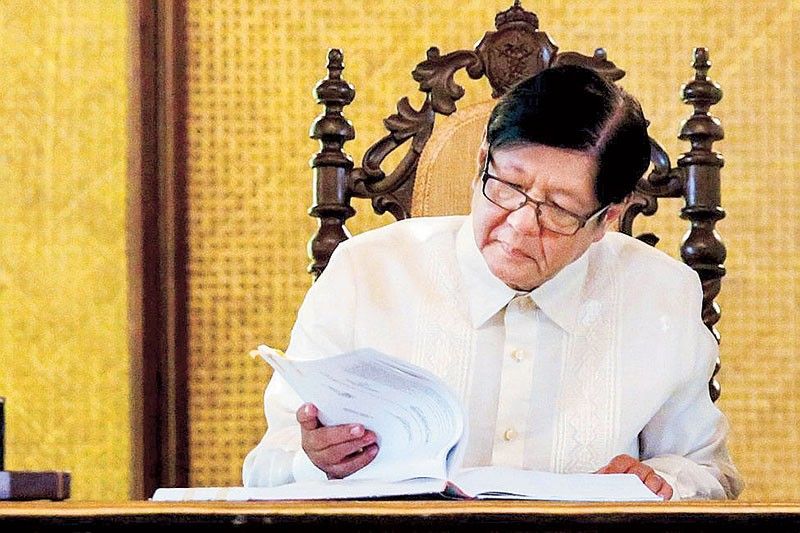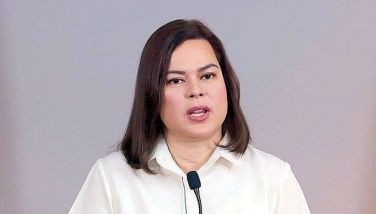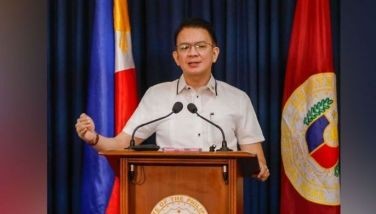Marcos signs P6.3 trillion budget, vetoes P194 billion

AKAP fund, zero PhilHealth subsidy retained
MANILA, Philippines — Citing the need to focus on development priorities and heed public clamor, President Marcos vetoed more than P194 billion worth of items in the 2025 national budget that he signed into law yesterday, including several public works projects and unprogrammed appropriations that ballooned fourfold.
Even with the vetoed amounts, however, public works and unprogrammed appropriations retained much of the massive amounts that were inserted by lawmakers during the bicameral conference, way above what was proposed by the executive in the National Expenditure Program (NEP).
The vetoed amount in public works mainly ensured that the appropriation would be slightly lower than that for the entire education sector.
Speaking during the signing of the P6.326-trillion budget at Malacañang, Marcos said the executive branch is one with the people in raising concerns over appropriations that are neither consistent with the country’s development plans nor responsive to their needs.
“We take our role as stewards of our taxpayers’ money seriously. And for this reason, after an exhaustive and thorough review, we have directly vetoed over P194 billion worth of the line items that are not consistent with our programmed priorities,” the President said in a prepared speech delivered in the presence of lawmakers who passed the spending bill.
“These include allocations for certain programs and projects of the Department of Public Works and Highways (DPWH) and those under the unprogrammed appropriations, which increased by 300 percent,” he added.
Marcos also placed under conditional implementation 12 projects, including the Ayuda sa Kapos ang Kita Program (AKAP), which seeks to protect minimum wage earners from the impact of rising commodity prices. Implementing rules or guidelines have to be issued to release the funding for programs under conditional implementation.
“This approach is anchored on a simple yet profound truth: the appropriation of public funds must not break the public trust,” the President said.
The version of the budget passed by Congress earlier this month had drawn flak for supposedly containing “unconstitutional” provisions as well as allocations deemed not aligned with the Marcos administration’s policy direction.
Among the issues raised against the spending bill were the hefty increase in the public works budget that allegedly surpassed that of education, the sector that should receive the highest budgetary priority under the Constitution; the multibillion-peso cut in the budget of the Department of Education (DepEd) and the zero subsidy for state-run Philippine Health Insurance Corp. (PhilHealth).
Executive Secretary Lucas Bersamin expressed optimism that the budget signed by Marcos can withstand legal scrutiny.
“We are confident, but we cannot prevent if there will be challenges that will be mounted by any quarter who might still find this present budget as approved worthy of the challenge. But, that is something that we cannot prevent. But, I am confident that we worked very hard on this and that our efforts will be validated,” Bersamin, a former chief justice, said at a press briefing yesterday.
“Based on my experience as a member of the judiciary, it is difficult to bring this to the Supreme Court if the two branches of government acted in good faith,” he added, referring to the executive and legislative branches.
Budget Secretary Amenah Pangandaman pointed out that while Congress has the power of the purse, the executive branch can veto certain items in the budget.
“The President ensured that the budget remained true to our constitutional mandates while exercising his veto power to ensure that the budget ultimately continues to be directed to meeting our agenda for prosperity,” she said.
Marcos vetoed P26 billion worth of public works projects and P168 billion worth of unprogrammed appropriations, reducing next year’s budget to P6.326 trillion from P6.352 trillion.
DPWH Secretary Manuel Bonoan said the vetoed public works projects were “not totally supportive” of the administration’s eight-point socio-economic agenda.
“Some of the projects are not ready for implementation at this point in time. So, these are projects that we have deferred,” Bonoan said.
In an interview with “Storycon” on One News, DPWH Assistant Secretary Mary Anne dela Vega said over P200 billion worth of DPWH projects would be placed under conditional implementation next year.
She explained why President Marcos vetoed only P26 billion in the DPWH’s proposed budget of over P1.1 trillion for 2025.
“It was retained because it will have a huge impact,” she said in Filipino, referring to the “excess” budget given by Congress to the agency. “We cannot allow the removal of the P200 (billion) plus because it will have a significant effect in our economy and in the remaining projects of DPWH.”
With regard to the vetoed unprogrammed funds, Pangandaman said the President’s action was meant to keep contingent funds equivalent to five percent of the budget. She explained the contingency fund proposed by the executive branch was equivalent to less than five percent of the budget, but lawmakers raised it by 300 percent or about 10 percent of the spending program. “Now, it’s roughly 4.7 percent of the total budget,” the budget chief said.
If a project under conditional implementation fails to satisfy the requirements set by the government, its budget would not be released.
Marcos said the AKAP was subjected to converging efforts of the social welfare and labor departments and the National Economic and Development Authority (NEDA) to improve the lives of beneficiaries while guarding against misuse, duplication and fragmented benefits.
NEDA Secretary Arsenio Balisacan said Marcos’ actions were in line with the government’s commitment to public welfare and fiscal responsibility.
“This decisive action demonstrates the administration’s commitment to our fiscal program by ensuring that planned spending remains within the target deficit ceiling, keeping us on track to meet our medium-term fiscal targets,” Balisacan said.
“At the same time, by tightening the conditions for utilizing the budget for various programs, the President ensures that the maximum benefits reach those most deserving of social protection, particularly the near poor,” he said.
Data from the budget department showed that the education sector, including state universities and colleges, received the biggest outlay with P1.055 trillion, followed by public works with P1.007 trillion.
Other agencies with the highest allocations are defense (P315.1 billion), interior and local government (P279.1 billion), health (P267.8 billion), agriculture (P237.4 billion), social welfare (P217.5 billion), transportation (P123.7 billion), judiciary (P64 billion), justice (P42.2 billion) and labor and employment (P39.5 billion).
P12 billion for DepEd?
Asked how the Marcos administration managed to restore the P12-billion reduction in the DepEd budget as promised by the President, Pangandaman noted that the executive branch may only veto line items and cannot add to the spending bill passed by Congress.
“However, under the budget, we have certain funds that can augment our budget. For example, the unprogrammed appropriations... as long as there is additional revenue from the DOF (Department of Finance), we can actually augment or increase the budget of DepEd specifically for the computerization program,” the budget chief said.
Pangandaman said the unprogrammed appropriations can also be used to support the Armed Forces of the Philippines’ modernization program, whose budget was reduced to P35 billion from the P50 billion originally proposed by the executive branch.
The administration also stood by its decision to support the zero subsidy for PhilHealth and assured the public that the services provided by the state health insurer would continue.
“My understanding is that Congress did that because the...corporate operating budget of PhilHealth is sufficient. They have reserve funds of roughly P280 billion. They have a surplus of roughly P150 billion, the last time I looked at it. They have investments of more than P400 billion. They will earn P200 billion in 2025. They will spend P150 billion, so their surplus will again increase by P50 billion. So, they have adequate resources,” Recto said.
“We will ensure that the benefits of all Filipinos under PhilHealth will continue and expand,” the President added.
Meanwhile, Senate President Francis Escudero welcomed the signing of the budget program for 2025.
“What is important is that the 2025 GAA was signed before the year ended and the country avoided starting the New Year on a reenacted budget,” Escudero said.
“If governance is defined as ‘allocating scarce resources’ then I am truly elated and encouraged that the people and all the branches of government took an active part in governance and governing of our country,” he added.
“No one branch reigns supreme and dictates over the other. The expression of divergent and different opinions, views and suggestions regarding the GAA are all well taken and are part and parcel of the process,” Escudero pointed out.
Speaker Martin Romualdez, for his part, said the budget embodies the shared commitment of Marcos and Congress to make life better for the Filipino people.
“This budget represents the efficient and responsible use of resources, balancing fiscal discipline with the government’s commitment to improving the quality of life for all Filipinos. It is a critical step toward sustained growth and national development,” Romualdez said.
“This budget reflects our united effort to ensure that government programs truly serve the people,” he said.
“We respect the President’s constitutional prerogative and judgment. Congress remains committed to working closely with the executive branch,” Rep. Zaldy Co, chairman of the House appropriations committee, said. — Janvic Mateo, Cecille Suerte Felipe, Delon Porcxalla
- Latest
- Trending






























